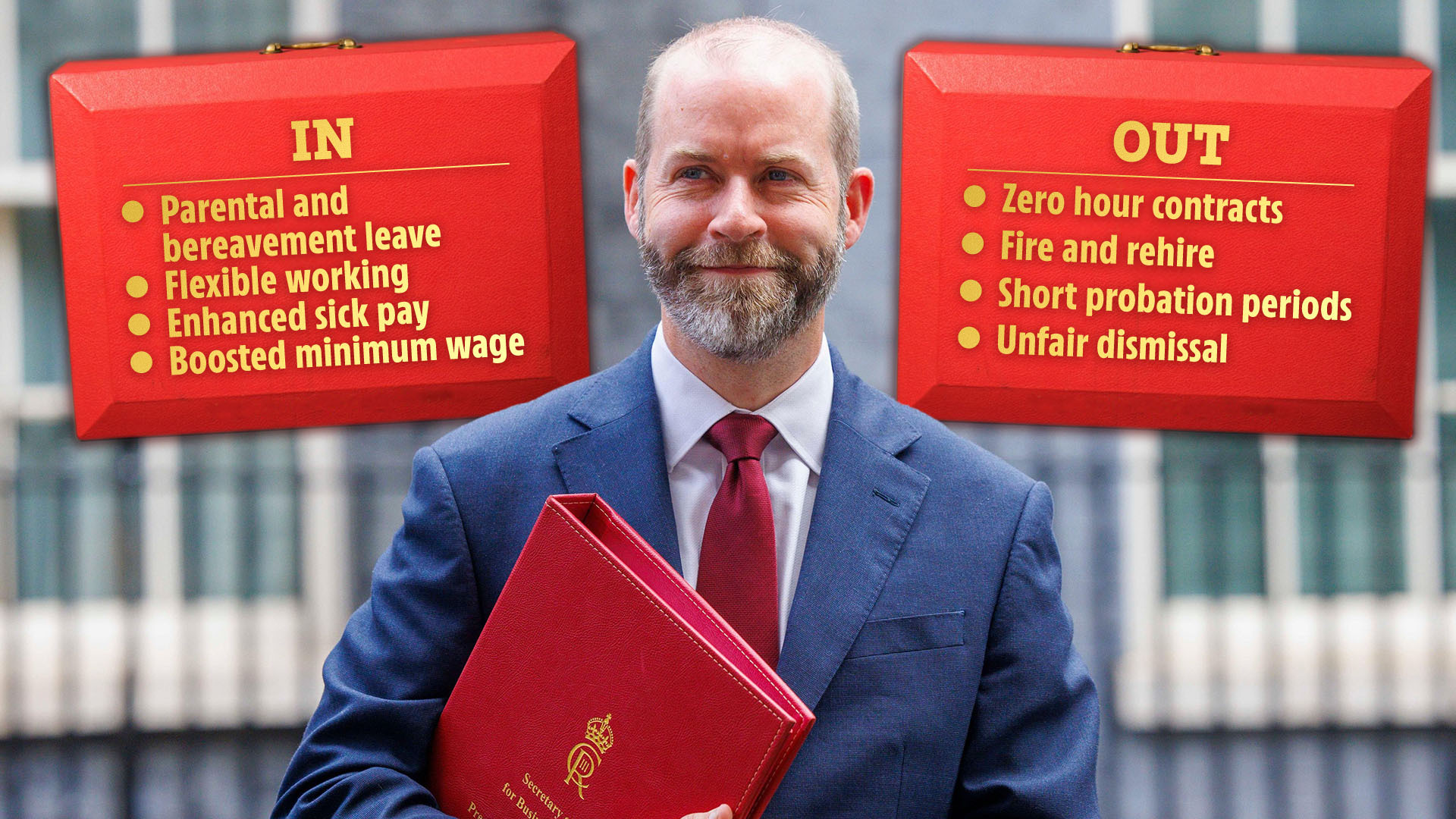Money
Eight big changes to workers rights including maternity and sick pay – what the shake up means for you

MILLIONS of workers are set to receive enhanced sick pay, maternity benefits, and stronger job protections under new Labour proposals.
The Employment Rights Bill, unveiled this morning, will grant sick pay from the very first day of illness.
Pregnant women and new mothers will also benefit from stronger protections when returning to work.
Zero hour contracts and fire and rehire practices, long deemed exploitative, are also set to be abolished.
Business Secretary Jonathan Reynolds said the Employment Rights Bill will elevate the baseline of employment rights and improve living standards nationwide.
In a statement this morning, he said: “This is a pro-worker, pro-business plan.
“The government will tackle head-on the issues within the UK labour market that are holding Britain back.
“The Plan to Make Work Pay sets out a vision for modern and fair employment protections that will set the country up for the future.”
Details of many policies in the Bill will now go through a consultation process.
The government added that it expects the new rules to come into force in 2026.
For now, we’ve outlined exactly what’s on the table and what it means for you.
Parental and bereavement leave
Currently, only individuals legally classified as employees are eligible for paternity leave.
To qualify, one must have been continuously employed by their employer for at least 26 weeks leading up to any day in the “qualifying week,” the 15th week before the baby’s due date.
This means those classified as workers are not entitled to paternity leave and must use their annual leave to take time off.
The Employment Rights Bill aims to change this by introducing day-one entitlement to paternity leave and unpaid parental leave.
It will also improve maternity protections for expecting and new mothers.
This includes protection from dismissal whilst pregnant, on maternity leave and within six months of returning to work.
Plus, the Bill will also establish a statutory entitlement to bereavement leave.
At the moment, there is no legal right to paid time off for bereavement in the UK, but employers can offer it voluntarily.
Flexible working
Flexible working is a way of working that suits an employee’s needs, for example having flexible start and finish times, or working from home.
Currently, all employees have the legal right to request flexible working.
An employer can refuse an application if they have a good business reason for doing so.
However, the Employment Rights Bill will give employees the right to flexible working as default.
The move is said to increase the likelihood of a request for flexible working arrangements to be granted.
However, if an employer can prove this work pattern is “unreasonable” they might still be able to deny it.
At the moment, it’s not clear how these reasons will be interpreted.
Sick pay
Under current statutory sick pay rules, only those earning an average of over £123 a week are eligible.
Those who qualify receive £116.75 per week if they are too ill to work.
Your employer pays this amount for up to 28 weeks, with payments starting after the first three days of leave.
However, the Employment Rights Bill proposes eliminating the earnings threshold to qualify.
It will also ditch the three-day waiting period before workers begin receiving payments.
THE SUN SAYS
LABOUR’S new workers’ rights reforms are focused on the wrong thing…
Euan Blair made a fortune and created hundreds of jobs by ingeniously exploiting one of his own dad Tony’s biggest mistakes. His insight is worth reading.
He seemingly realised the ex-PM’s zeal to get half our school pupils to university was folly.
Because even a top-flight degree doesn’t guarantee them a job, let alone a lucrative and fulfilling career.
Euan’s hugely successful start-up matches young talents with apprenticeships at big employers without the need for three expensive and sometimes pointless years at uni.
And when he now says Labour’s new workers’ rights reforms are focused on the wrong thing, he’s hit the nail on the head again.
Angela Rayner may think it’s vital to let more people work from home, do a four-day week or ban the boss from calling after 6pm.
None of that will matter a jot if the tsunami of AI sweeps away their job and millions more.
This Government, Euan says, is in danger of “fixing the problems of yesterday” while losing sight of tomorrow’s.
The future, he says, rests on reskilling workers for the looming tech revolution.
You can read about it here. We hope they do so in No10 too — and take notice.
Unfair dismissal
Dismissal is when your employer ends your employment – they do not always have to give you notice.
If you have been with the company for at least two years, you have the right to receive a written explanation, which should be in the form of a letter or email.
The law states that it is always unfair if you are dismissed for an “automatically unfair” reason.
You can also challenge your employer if they dismiss you for a discriminatory reason.
If you were dismissed for a different reason and have worked for your employer for less than two years, you do not have the right to challenge it.
However, the Employment Rights Bill promises day one protection from unfair dismissal.
According to officials, around nine million workers who have been with their employer for less than two years will benefit from this change.
Probation periods
A probation period is a designated timeframe at the start of an individual’s employment, during which they can be dismissed with little or no notice if deemed unsuitable for the role.
Currently, there are no specific rules on the duration of these periods, which typically range from three to six months in the UK.
However, the Employment Rights Bill proposes introducing a statutory probation period for new hires, with the government consulting on a nine-month duration.
The government asserts that this will allow for a thorough assessment of an employee’s suitability for a role while reassuring employees that they have rights from day one.
It suggests this initiative will enable businesses to take chances on new hires and give more people the confidence to re-enter the job market or change careers, ultimately improving their living standards.
Zero hour contracts
A zero hour contract, also known as a casual contract, is an employment agreement where the employer does not guarantee a minimum number of working hours for the employee.
At the same time, the employee is not obliged to accept any work offered.
The Employment Rights Bill promises to ditch zero hour contracts in their current form.
This legislation will provide casual workers the right to a guaranteed hours contract if they have worked regular hours over a defined period, thereby offering greater earnings security.
However, the government has confirmed that individuals who prefer to remain on zero hour contracts will still have the option to do so.
Fire and rehire
Fire and rehire, also known as dismissal and re-engagement, is a practice where an employer sacks employees and rehires them on different, often less favourable, terms and conditions.
This approach is typically employed when employers seek to implement changes to employment contracts that employees might not voluntarily accept.
Currently, fire and rehire is not outright illegal in the UK.
However, the Employment Rights Bill will ban the practice in all but extreme circumstances.
Minimum wage
Currently, there are two different minimum wage rates that all workers across the UK are entitled to: the National Minimum Wage and the National Living Wage.
The National Minimum Wage (NMW) is the minimum pay per hour for workers who have left school.
Right now, 18 to 20-year-olds must earn at least £8.60 an hour.
Meanwhile, the National Living Wage is the minimum wage for those over 21, and is slightly higher.
It was previously only available to those over 23, but this was adjusted to 21 and over in November 2023.
It’s currently worth £11.44 an hour.
Young workers aged 18 to 20 are expected to see a substantial increase in their statutory rate as the Employment Rights Bill will direct the Low Pay Commission to remove all age bands that set lower minimum wages for younger staff.
When was the minimum wage introduced?
THE first National Minimum Wage was put in place in 1998 by the Labour government.
It originally applied to workers aged 22 and over, and there was a separate rate for those aged 18-21.
A separate rate for 16-17-year-olds was introduced in 2004, and in 2010, 21-year-olds became eligible for the adult rate of the National Minimum Wage.
The rate is set by the Government each year based on recommendations by the Low Pay Commission (LPC).
Money
Platform selection tension

 When selecting platforms, advisers have to reconcile two opposing interests – the needs of the client and the needs of the firm.
When selecting platforms, advisers have to reconcile two opposing interests – the needs of the client and the needs of the firm.
Platforms are products for clients, and they are the ones who almost always pay for them. But the reality is that platforms primarily provide services to advisers to help them look after their clients’ portfolios.
The two purposes have different selection criteria. There is clear evidence advisers are shifting their view of platforms and how they choose them, and that they are primarily focusing on their own needs, according to our latest UK Adviser Platforms: Platform Selection report.
This horses-for-courses approach became less relevant as platforms became more similar in their pricing and capabilities
But the good news is that maybe this is in the clients’ best interests after all.
The ‘platform as product’ approach was dominant for many years. Platforms have come in many shapes and sizes, each with their own particular features and even peculiarities.
Charging structures varied – some were great for smaller clients, while others were better for large portfolios or clients with workplace pensions.
Functionality was also different across the market. Some platforms were fine if you stuck to simple transactions, while others could handle more complicated and specialised business.
So, a firm with a range of client profiles typically used a variety of different platforms and selected them on a client-by-client basis.
Platforms may be basically quite similar but they all have their own idiosyncrasies that advisers and support staff need to master
But this horses-for-courses approach became less relevant as platforms became more similar in their pricing and capabilities. Nowadays, maximum platform charges are mostly clustered around the 0.3%-0.35% and they are expected to include almost every functionality.
Differences remain, but they have become less important, except perhaps in a few special situations.
As charges and features have converged and some platforms have become sufficiently cheap and capable for the needs of most clients, it was enough to use just one or perhaps two or three platforms.
Of course, some advisers had long ago decided to focus on a very few platforms because they had low-cost special deals with providers that were competitive for virtually all their clients – or, in a few cases, they simply had a homogeneous clientele.
Unsurprisingly, some players have called for more transparency about special deals and platform charges that mostly remain confidential
Selection on a client-by-client basis may have optimised individual client suitability (at least theoretically) but it bred inefficiencies for the advice firms that used this approach.
Platforms may be basically quite similar but they all have their own idiosyncrasies that advisers and support staff have needed to master.
Using multiple platforms means less expertise within firms in using individual platforms, together with more admin, more staff training and greater danger of mistakes. All these risks and costs are ultimately passed on to clients.
Consumer Duty’s ever-expanding requirements for advice firms is also looming over advisers’ heads. Less efficiency and higher costs limit the scope to charge clients less.
The drive for efficiency has led many advisers to think differently and more strategically about the way they select platforms. The average number of platforms advisers use has declined as they increasingly regard them as the administrative ‘plumbing’ for clients’ investments. So, what’s changed and what has stayed the same?
Advisers’ growing focus on using fewer platforms has yet to reduce platforms numbers in the market
Pricing remains important. Concentrating business onto one or two platforms allows newer platforms with whizzier tech to provide very competitive standard pricing in the mid to low teens or even less. Older platforms can often offer special deals that can match these rates or better them.
Unsurprisingly, some players have called for more transparency about special deals and platform charges that mostly remain confidential.
But clients of firms that cling to the horses-for-courses approach and pay the standard charges are probably missing out.
The adoption of adviser-controlled platforms is another sign of this shift. Larger firms are more likely to go down this route, pioneering greater control of their advice process as well as lower charges, some of which they might pass onto clients.
Another symptom is the acceleration in the volume of transfers between platforms. Over 50% of advisers have transferred assets in the last 12 months – many citing cost and service as primary drivers. Advice firm consolidation is also a powerful push factor.
Advisers’ growing focus on using fewer platforms has yet to reduce platforms numbers in the market. But with more platform switching, winners and losers are bound to emerge – with the inevitable platform consolidation to follow.
Lottie Bussell-Ahern is associate analyst at Platforum
Money
Martin Lewis warns against paying household bill monthly – and how using a credit card can even make it CHEAPER

MARTIN Lewis has warned against paying a regular household bill monthly – and it could even be cheaper covering the cost using a credit card.
The consumer champion said to steer clear of paying for car insurance in regular instalments over the year and instead pay annually if you can.
In a recent poll on X, Lewis asked his followers how they pay for motor cover, with over 32% revealing they do it via monthly direct debit.
In response to the figures, Martin said he was taken aback at how many were not paying up front.
This is because when you pay monthly, the insurer classes it as you taking out a loan and charges you interest, meaning you pay more.
When you pay up front there’s no interest on top.
Read more on Car Insurance
Martin said: “Monthly direct debit is a LOAN – they pay the year for you and loan you the money often at 20% – 40% APR way more than a typical credit card.
“I’m shocked by how many pay by monthly DD. Avoid if at all possible.”
Martin went on to say while he understood paying for car insurance monthly can help drivers budget, the APR’s charged by many big insurers mean a cheaper option can be paying annually with a credit card, ideally charging 0%.
And even some credit cards without interest-free periods charge lower rates than insurers.
APR refers to the total cost of your borrowing for the year.
Martin added: “If you have to, most would be far better to put it on a 0% card and repay it over the 12 months.
“Or even a standard high st card with APR 20%, undercuts many big insurers who charge up to 40% APR.”
The latest MSE newsletter revealed how Direct Line charges 23% APR, Aviva 16%, Esure 26% and Hedgehog 44%.
How to use a credit card to pay for car insurance
Interest-free credit cards let you spend for a set period of time without being charged interest, after which point you are.
However, you still have to make monthly repayments and if you miss them can see your 0% interest deal removed.
But they can be a good option if you need to cover an up front cost, like an annual payment for car insurance.
In this case, you would pay for your car insurance up front using the credit card, then pay off the balance each month.
This of course means you would have to work out how much you need to pay off each month so you are not left with any outstanding balance after the 0% interest period ends.
As an example, if your car insurance policy cost £480 for the year and your 0% period lasted 12 months, you would need to pay off £40 on the credit card each month.
You may also be able to pay a minimum payment each month, which makes your repayments more manageable.
However, you may breach the 0% interest period and have to pay interest on any outstanding balance which will cost you more overall.
Meanwhile, if you’re using a normal credit card to pay for your car insurance up front, paying just the minimum amount each month may be more expensive than paying your insurer monthly if it means you are paying off the loan, and the interest on that loan, over a longer time.
Of course, always bear in mind that a credit card is still borrowing and if you are using one to pay for your car insurance, try limiting it to just that and don’t use it on other spending as your repayment costs could rack up.
If you do miss monthly repayments, you can be hit with late payment fees with the typical charge around £12.
Meanwhile, not everyone will be eligible for a 0% credit card and you may be refused one if your credit rating is poor.
You can check our the best credit card deals by going on price comparison sites like MSE, MoneySuperMarket and Compare the Market.
How else to save money on car insurance
Tom Banks, car insurance expert from GoCompare previously told The Sun it’s worth parking your vehicle in a garage or driveway, if you have one, as parking off-road can lower the chances of it being vandalised or stolen.
“Insurers will deem you as less of a risk to insure, thereby lowering your premium,” he explained.
If you’ve got the budget, consider installing alarms and other safety devices in your car too.
“These could help bring your car insurance cost down, as well as keeping your vehicle safe,” Tom advised.
Up your voluntary excess as well – this is the maximum figure you have to pay if you are involved in an accident.
By increasing your excess, you are taking on more financial responsibility for your driving – insurers reward this by offering you a cheaper premium.
If you’ve recently added any modifications to your car, make sure they are included in your policy to ensure you’re covered as well.
If not, you may find your policy is invalidated and you’re forced to pay out over the odds in the case of an accident.
What is car insurance?

Consumer reporter Sam Walker talks you through what car insurance is and what it covers you for…
Car insurance pays out if your vehicle is stolen, damaged, catches on fire or is involved in an accident.
As a minimum, it protects you against any damage you case to other road users, the public or their property – these are called third parties.
You only need to claim on your car insurance when an accident is your fault.
If another motorist is to blame, their insurance should pay out instead.
Car insurance, unlike home insurance, is a legal requirement and if you don’t have it you can be fined up to £1,000.
You can also have your vehicle seized and destroyed.
However, you don’t need to insure your car if it is classed as “off-road”, or holds a statutory off road notification (SORN).
The vehicle has to be kept on private land and not a public highway though.
Do you have a money problem that needs sorting? Get in touch by emailing money-sm@news.co.uk.
Plus, you can join our Sun Money Chats and Tips Facebook group to share your tips and stories
Money
CISI appoints Neil Atkinson as board member


The Chartered Institute for Securities & Investment (CISI) has appointed Neil Atkinson as a new member of its board.
The board of directors is comprised of representatives who are typically drawn from the financial services sector and meet four to five times a year.
Atkinson is Euroclear managing director (MD) and global client executive. Prior to that he was HSBC MD, global head, platform solutions.
He has over 30 years financial services experience and specialises in capital markets, post trade, financial market infrastructure and clearing and settlement.
Atkinson is a CISI chartered fellow, member of the CISI membership and international committees, and has received a Leader Coach Accreditation from the Association for Coaching.
CISI chair Michael Cole-Fontayn said: “We are delighted to welcome Neil to the CISI board of directors.
“We look forward to his support and leadership as we continue to grow our global membership, promoting lifelong learning, qualifications, standards, trust and the importance of professionalism.”
In July 2024, the CISI announced it is working with The Institute and Faculty of Actuaries (IFoA) to support actuaries in their understanding of ethical issues when deploying artificial intelligence (AI).
This means the IFoA’s 32,000+ members can now study for the CISI certificate in ethical AI.
Money
I tried the new McDonald’s Halloween menu before anyone else – fans of the Toffee Latte are in for a treat

MCDONALD’S is switching up its menu just in time for Halloween, including adding two never-before-seen hot drinks.
The home of the Big Mac is also known for its extensive drinks menu, which includes a range of shakes, coffees and frappes.
The fast-food chain frequently treats fans to a number of limited edition drinks, including the brand-new Twix Latte which was launched last month.
Now, the home of the Golden Arches is adding two more hot drinks for Halloween.
A new Toasted Marshmallow Latte and Toasted Marshmallow Hot Chocolate will be available from October 16.
Meanwhile, fans of the popular Mozzarella Dippers will be excited brand-new Cheese Bites will be coming to a restaurant near you on the same day.
One popular breakfast item has also been given an upgrade this autumn.
The iconic McDonald’s Hash Brown will be available in a new Mini size with the same crispy exterior and soft fluffy interior we all know and love.
I got an exclusive invite to try three of the new menu items before anyone else ahead of their public debut next week.
I’ve always been a fan of a coffee in the morning, so I was keen to give the new Toasted Marshmallow Latte a taste.
The coffee is strong but the toasted marshmallow flavoured syrup and dusting satisfy any sweet tooth.
It’s very similar to the popular Toffee Latte but has been given an autumnal twist.
It’s the perfect drink for a cold winter’s morning and I’m sure commuters will be queuing to grab one before they head into the office.
The whipped cream on top felt indulgent at first, but it melted quickly into the warm coffee, giving it a surprisingly smooth texture.
I’d give it a 4 out of 5.
Those who don’t like coffee are also covered as the fast-food giant has launched a Toasted Marshmallow Hot Chocolate, which has the same marshmallow syrup and flavoured dusting.
When I take a sip my mouth is filled with the rich chocolate, which is sickly sweet.
Fans of a Starbucks Classic or White Hot Chocolate will love it but I found it overpoweringly sugary.
Overall I’d score it a 3.5 out of 5.
What’s joining the McDonald’s menu?

The Halloween menu items are:
- Cheese Side – £2.49
- Cheese Side Sharebox – £6.79
- Toasted Marshmallow Latte – £2.59
- Toasted Marshmallow Hot Chocolate (Only available in Large) – £2.19
- McCrispy® Deluxe – £5.99
- McCrispy® Deluxe Medium Meal – £7.79
- Halloween M&M’s® McFlurry® – £2.19
- Halloween M&M’s® McFlurry® Mini – £1.59
- Galaxy® Caramel McFlurry® – £2.19
- Galaxy® Caramel McFlurry® Mini – £1.59
- Toffee Apple Pie – £1.99
- Mini Hash Browns Single Portion – £1.49
- Mini Hash Browns Sharebox – £2.99
The Toasted Marshmallow Latte costs £2.59 while the Toasted Marshmallow Hot Chocolate is only £2.19.
I’m a big fan of McDonald’s Cheese Melt Dippers, so I had high hopes for the brand-new Cheese Bites.
And I’m pleased to say I was not disappointed.
The mozzarella and emmental flavours hit my taste buds as soon as I bit into one of the bite-sized pieces.
Meanwhile, the smoky caramelised onion flavoured breadcrumb coating added a sophisticated flavour to what is otherwise, essentially, a lump of cheese.
The Cheese Bites come with a BBQ Dip, but I don’t think they needed it as they packed a serious punch on their own.
I’d rate them a solid 4.5 out of 5.
They come in portions of five for £2.49 or a sharebox of fifteen for £6.79.
Last up were the new Mini Hash Browns.
I have always been a sucker for a Hash Brown, so I was keen to give the new Mini version a try – and they did not disappoint.
The outside is extra golden and crunchy, as you would hope with any good Hash Brown.
But because they’re smaller than the original there is more batter, which makes them extra crunchy.
Inside the potato is still soft and fluffy while melting in the mouth.
I’d say they are better than the original Hash Brown and would give them a score of 4.5 out of 5.
Unlike the Cheese Bites, the Hash Browns do not come with sauce – but I think they are much tastier when dipped in tomato ketchup or brown sauce.
I definitely think it’s worth getting a dip to go.
Maccies fans can pick up five for £1.49 or a sharebox of 15 for £2.99.
Does McDonald’s often change its menu?
It is not unusual for McDonald’s to make changes to its menu across its 1,400 stores.
Just last week the fast-food chain confirmed that it was bringing back the much-loved McRib burger which had not been seen in the UK for nearly ten years.
Meanwhile, last month saw the return of McDonald’s popular Monopoly game.
To celebrate the launch it added six new items to its menu, including the never-before-seen Twix Latte.
Do you have a money problem that needs sorting? Get in touch by emailing money-sm@news.co.uk.
Plus, you can join our Sun Money Chats and Tips Facebook group to share your tips and stories
Money
GPE reports spate of lettings in positive trading update

The company’s rent roll now stands at £109.6m, up 2% since the start of April.
The post GPE reports spate of lettings in positive trading update appeared first on Property Week.
Money
Brookfield trumps SEGRO with £557m agreed takeover of Tritax Eurobox

The offer represents a 28% premium over the market price of Tritax EuroBox shares at the end of May.
The post Brookfield trumps SEGRO with £557m agreed takeover of Tritax Eurobox appeared first on Property Week.
-

 Science & Environment3 weeks ago
Science & Environment3 weeks agoHyperelastic gel is one of the stretchiest materials known to science
-

 Science & Environment3 weeks ago
Science & Environment3 weeks agoHow to unsnarl a tangle of threads, according to physics
-

 Womens Workouts2 weeks ago
Womens Workouts2 weeks ago3 Day Full Body Women’s Dumbbell Only Workout
-

 Technology3 weeks ago
Technology3 weeks agoWould-be reality TV contestants ‘not looking real’
-

 Science & Environment3 weeks ago
Science & Environment3 weeks agoMaxwell’s demon charges quantum batteries inside of a quantum computer
-

 Science & Environment3 weeks ago
Science & Environment3 weeks ago‘Running of the bulls’ festival crowds move like charged particles
-
News3 weeks ago
the pick of new debut fiction
-

 Science & Environment3 weeks ago
Science & Environment3 weeks agoITER: Is the world’s biggest fusion experiment dead after new delay to 2035?
-

 Science & Environment3 weeks ago
Science & Environment3 weeks agoHow to wrap your mind around the real multiverse
-

 Science & Environment3 weeks ago
Science & Environment3 weeks agoSunlight-trapping device can generate temperatures over 1000°C
-

 Science & Environment3 weeks ago
Science & Environment3 weeks agoQuantum ‘supersolid’ matter stirred using magnets
-

 News3 weeks ago
News3 weeks agoOur millionaire neighbour blocks us from using public footpath & screams at us in street.. it’s like living in a WARZONE – WordupNews
-

 Science & Environment3 weeks ago
Science & Environment3 weeks agoLiquid crystals could improve quantum communication devices
-

 Science & Environment3 weeks ago
Science & Environment3 weeks agoQuantum forces used to automatically assemble tiny device
-

 Science & Environment3 weeks ago
Science & Environment3 weeks agoWhy this is a golden age for life to thrive across the universe
-

 Science & Environment3 weeks ago
Science & Environment3 weeks agoPhysicists are grappling with their own reproducibility crisis
-

 Science & Environment3 weeks ago
Science & Environment3 weeks agoTime travel sci-fi novel is a rip-roaringly good thought experiment
-

 Science & Environment3 weeks ago
Science & Environment3 weeks agoLaser helps turn an electron into a coil of mass and charge
-

 Science & Environment3 weeks ago
Science & Environment3 weeks agoNuclear fusion experiment overcomes two key operating hurdles
-

 Science & Environment2 weeks ago
Science & Environment2 weeks agoX-rays reveal half-billion-year-old insect ancestor
-
Business2 weeks ago
Eurosceptic Andrej Babiš eyes return to power in Czech Republic
-

 News4 weeks ago
News4 weeks ago▶️ Hamas in the West Bank: Rising Support and Deadly Attacks You Might Not Know About
-

 Science & Environment3 weeks ago
Science & Environment3 weeks agoCaroline Ellison aims to duck prison sentence for role in FTX collapse
-

 News3 weeks ago
News3 weeks agoYou’re a Hypocrite, And So Am I
-

 Sport3 weeks ago
Sport3 weeks agoJoshua vs Dubois: Chris Eubank Jr says ‘AJ’ could beat Tyson Fury and any other heavyweight in the world
-

 Science & Environment3 weeks ago
Science & Environment3 weeks agoNerve fibres in the brain could generate quantum entanglement
-

 News3 weeks ago
News3 weeks ago▶️ Media Bias: How They Spin Attack on Hezbollah and Ignore the Reality
-

 Technology2 weeks ago
Technology2 weeks ago‘From a toaster to a server’: UK startup promises 5x ‘speed up without changing a line of code’ as it plans to take on Nvidia, AMD in the generative AI battlefield
-

 Football2 weeks ago
Football2 weeks agoFootball Focus: Martin Keown on Liverpool’s Alisson Becker
-

 News3 weeks ago
News3 weeks agoNew investigation ordered into ‘doorstep murder’ of Alistair Wilson
-

 Science & Environment3 weeks ago
Science & Environment3 weeks agoA slight curve helps rocks make the biggest splash
-

 Science & Environment3 weeks ago
Science & Environment3 weeks agoRethinking space and time could let us do away with dark matter
-
Business2 weeks ago
Should London’s tax exiles head for Spain, Italy . . . or Wales?
-

 MMA2 weeks ago
MMA2 weeks agoConor McGregor challenges ‘woeful’ Belal Muhammad, tells Ilia Topuria it’s ‘on sight’
-

 Science & Environment3 weeks ago
Science & Environment3 weeks agoA new kind of experiment at the Large Hadron Collider could unravel quantum reality
-

 Science & Environment3 weeks ago
Science & Environment3 weeks agoFuture of fusion: How the UK’s JET reactor paved the way for ITER
-

 Science & Environment3 weeks ago
Science & Environment3 weeks agoWhy we need to invoke philosophy to judge bizarre concepts in science
-

 Science & Environment3 weeks ago
Science & Environment3 weeks agoA tale of two mysteries: ghostly neutrinos and the proton decay puzzle
-

 Science & Environment3 weeks ago
Science & Environment3 weeks agoUK spurns European invitation to join ITER nuclear fusion project
-

 News3 weeks ago
News3 weeks agoIsrael strikes Lebanese targets as Hizbollah chief warns of ‘red lines’ crossed
-

 Technology2 weeks ago
Technology2 weeks agoQuantum computers may work better when they ignore causality
-

 CryptoCurrency3 weeks ago
CryptoCurrency3 weeks agoCardano founder to meet Argentina president Javier Milei
-
News3 weeks ago
The Project Censored Newsletter – May 2024
-

 News3 weeks ago
News3 weeks agoWhy Is Everyone Excited About These Smart Insoles?
-

 Science & Environment3 weeks ago
Science & Environment3 weeks agoMeet the world's first female male model | 7.30
-

 News3 weeks ago
News3 weeks agoFour dead & 18 injured in horror mass shooting with victims ‘caught in crossfire’ as cops hunt multiple gunmen
-

 Womens Workouts2 weeks ago
Womens Workouts2 weeks ago3 Day Full Body Toning Workout for Women
-

 Technology2 weeks ago
Technology2 weeks agoRobo-tuna reveals how foldable fins help the speedy fish manoeuvre
-

 Technology2 weeks ago
Technology2 weeks agoGet ready for Meta Connect
-

 Technology2 weeks ago
Technology2 weeks agoIs sharing your smartphone PIN part of a healthy relationship?
-

 Health & fitness2 weeks ago
Health & fitness2 weeks agoThe 7 lifestyle habits you can stop now for a slimmer face by next week
-

 Sport2 weeks ago
Sport2 weeks agoWatch UFC star deliver ‘one of the most brutal knockouts ever’ that left opponent laid spark out on the canvas
-

 Technology3 weeks ago
Technology3 weeks agoThe ‘superfood’ taking over fields in northern India
-

 Health & fitness3 weeks ago
Health & fitness3 weeks agoThe maps that could hold the secret to curing cancer
-

 Health & fitness3 weeks ago
Health & fitness3 weeks agoThe secret to a six pack – and how to keep your washboard abs in 2022
-

 Science & Environment3 weeks ago
Science & Environment3 weeks agoBeing in two places at once could make a quantum battery charge faster
-

 CryptoCurrency3 weeks ago
CryptoCurrency3 weeks agoLow users, sex predators kill Korean metaverses, 3AC sues Terra: Asia Express
-
Politics3 weeks ago
UK consumer confidence falls sharply amid fears of ‘painful’ budget | Economics
-

 Womens Workouts3 weeks ago
Womens Workouts3 weeks agoBest Exercises if You Want to Build a Great Physique
-

 Womens Workouts3 weeks ago
Womens Workouts3 weeks agoEverything a Beginner Needs to Know About Squatting
-

 TV3 weeks ago
TV3 weeks agoCNN TÜRK – 🔴 Canlı Yayın ᴴᴰ – Canlı TV izle
-

 Science & Environment3 weeks ago
Science & Environment3 weeks agoCNN TÜRK – 🔴 Canlı Yayın ᴴᴰ – Canlı TV izle
-

 Servers computers2 weeks ago
Servers computers2 weeks agoWhat are the benefits of Blade servers compared to rack servers?
-
Business1 week ago
Ukraine faces its darkest hour
-
Business3 weeks ago
JPMorgan in talks to take over Apple credit card from Goldman Sachs
-

 Science & Environment3 weeks ago
Science & Environment3 weeks agoQuantum time travel: The experiment to ‘send a particle into the past’
-

 CryptoCurrency3 weeks ago
CryptoCurrency3 weeks agoBitcoin miners steamrolled after electricity thefts, exchange ‘closure’ scam: Asia Express
-

 CryptoCurrency3 weeks ago
CryptoCurrency3 weeks agoDorsey’s ‘marketplace of algorithms’ could fix social media… so why hasn’t it?
-

 CryptoCurrency3 weeks ago
CryptoCurrency3 weeks agoDZ Bank partners with Boerse Stuttgart for crypto trading
-

 CryptoCurrency3 weeks ago
CryptoCurrency3 weeks agoBitcoin bulls target $64K BTC price hurdle as US stocks eye new record
-

 Science & Environment3 weeks ago
Science & Environment3 weeks agoHow one theory ties together everything we know about the universe
-

 News3 weeks ago
News3 weeks agoChurch same-sex split affecting bishop appointments
-

 Science & Environment3 weeks ago
Science & Environment3 weeks agoTiny magnet could help measure gravity on the quantum scale
-

 CryptoCurrency3 weeks ago
CryptoCurrency3 weeks agoBlockdaemon mulls 2026 IPO: Report
-

 Sport3 weeks ago
Sport3 weeks agoUFC Edmonton fight card revealed, including Brandon Moreno vs. Amir Albazi headliner
-

 CryptoCurrency3 weeks ago
CryptoCurrency3 weeks agoEthereum is a 'contrarian bet' into 2025, says Bitwise exec
-

 News2 weeks ago
News2 weeks agoUS Newspapers Diluting Democratic Discourse with Political Bias
-

 Technology2 weeks ago
Technology2 weeks agoThe best robot vacuum cleaners of 2024
-

 Politics3 weeks ago
Politics3 weeks agoTrump says he will meet with Indian Prime Minister Narendra Modi next week
-

 CryptoCurrency3 weeks ago
CryptoCurrency3 weeks agoDecentraland X account hacked, phishing scam targets MANA airdrop
-

 CryptoCurrency3 weeks ago
CryptoCurrency3 weeks agoRedStone integrates first oracle price feeds on TON blockchain
-

 CryptoCurrency3 weeks ago
CryptoCurrency3 weeks ago‘No matter how bad it gets, there’s a lot going on with NFTs’: 24 Hours of Art, NFT Creator
-

 Science & Environment3 weeks ago
Science & Environment3 weeks agoHow do you recycle a nuclear fusion reactor? We’re about to find out
-
Business3 weeks ago
Thames Water seeks extension on debt terms to avoid renationalisation
-

 CryptoCurrency3 weeks ago
CryptoCurrency3 weeks agoCoinbase’s cbBTC surges to third-largest wrapped BTC token in just one week
-
Business3 weeks ago
How Labour donor’s largesse tarnished government’s squeaky clean image
-
Politics3 weeks ago
‘Appalling’ rows over Sue Gray must stop, senior ministers say | Sue Gray
-

 Technology3 weeks ago
Technology3 weeks agoiPhone 15 Pro Max Camera Review: Depth and Reach
-

 News3 weeks ago
News3 weeks agoBrian Tyree Henry on voicing young Megatron, his love for villain roles
-

 News3 weeks ago
News3 weeks agoBrian Tyree Henry on voicing young Megatron, his love for villain roles
-

 MMA3 weeks ago
MMA3 weeks agoRankings Show: Is Umar Nurmagomedov a lock to become UFC champion?
-

 Travel2 weeks ago
Travel2 weeks agoDelta signs codeshare agreement with SAS
-

 Politics2 weeks ago
Politics2 weeks agoHope, finally? Keir Starmer’s first conference in power – podcast | News
-

 CryptoCurrency3 weeks ago
CryptoCurrency3 weeks agoLouisiana takes first crypto payment over Bitcoin Lightning
-

 CryptoCurrency3 weeks ago
CryptoCurrency3 weeks agoCrypto scammers orchestrate massive hack on X but barely made $8K
-

 CryptoCurrency3 weeks ago
CryptoCurrency3 weeks agoTelegram bot Banana Gun’s users drained of over $1.9M
-

 Science & Environment3 weeks ago
Science & Environment3 weeks agoPhysicists have worked out how to melt any material
-

 Science & Environment3 weeks ago
Science & Environment3 weeks agoMost accurate clock ever can tick for 40 billion years without error
-

 CryptoCurrency3 weeks ago
CryptoCurrency3 weeks agoSEC asks court for four months to produce documents for Coinbase
-

 CryptoCurrency3 weeks ago
CryptoCurrency3 weeks ago‘Silly’ to shade Ethereum, the ‘Microsoft of blockchains’ — Bitwise exec






You must be logged in to post a comment Login